"Slavery is what it is; and it is nothing else" – Nathan Lord
Dartmouth’s extended public engagement with slavery discourse through its alumni body further illustrates the distinction between radical abolitionist thought and reformist compromise. The founding of the American Colonization society by Dartmouth alumni, which established the Christian colony of Liberia as the prospective home for freed black people, and Daniel Webster’s Senate speech in support of the 1850 Compromise, both demonstrate that Dartmouth’s engagement with anti-slavery politics was driven by a pragmatic confluence of political, economic, and social factors.
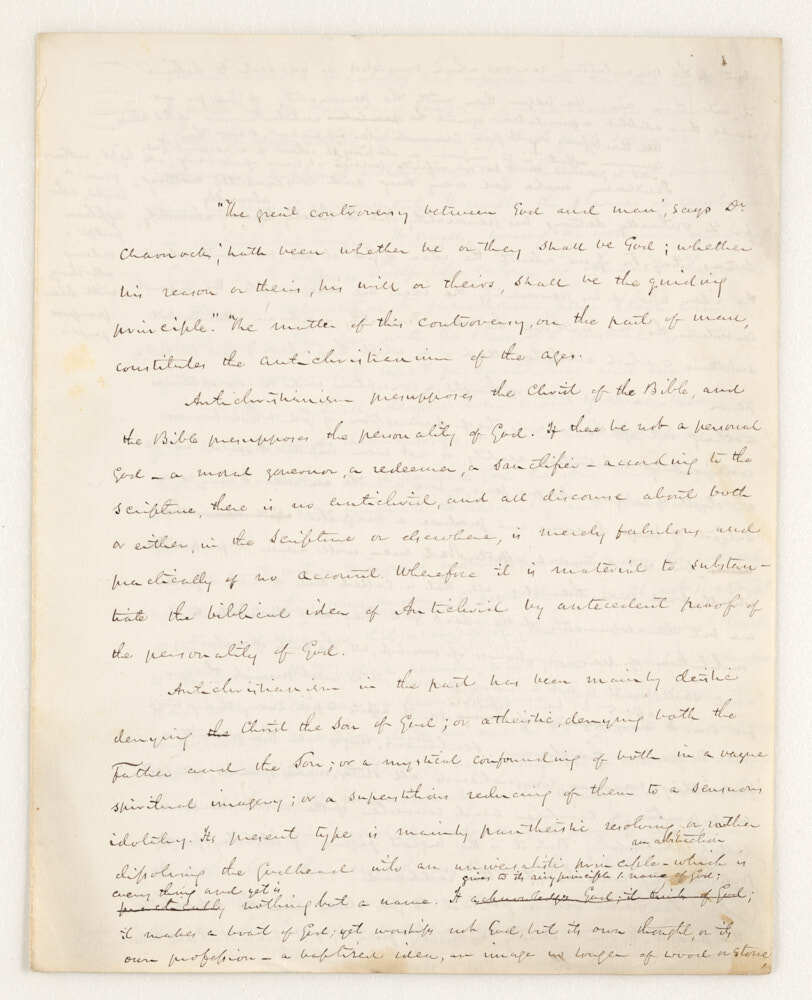
Nathan Lord, sermon, n. d. MS-510, Box 1, Folder 34
In this undated sermon, Dartmouth’s sixth President Nathan Lord addressed the issue of whether slavery was right or wrong. The sermon appears to have been written after Lord transitioned from being an abolitionist to being pro-slavery.
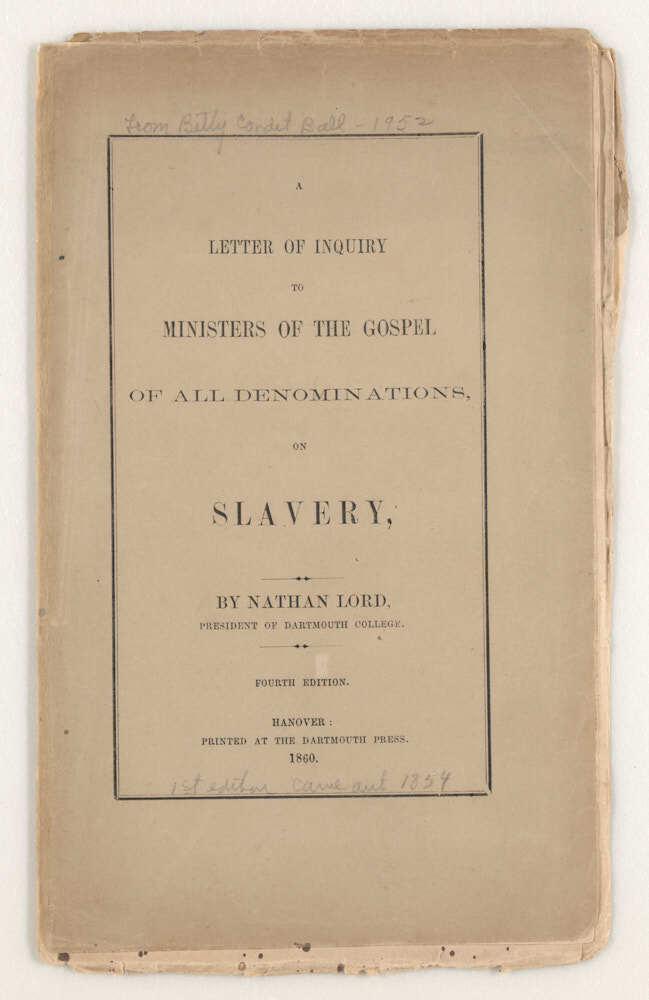
A Letter of Inquiry to Ministries of the Gospel of all Denomination, on Slavery by A Northern Presbyter, 4th edition, Hanover, NH. : Dartmouth Press, 1860. MS-510, Box 1, Folder 27
In this anonymously published pamphlet, Nathan Lord addresses the question of whether slavery is in accordance with Christianity. Lord desired readers to think critically about the institution of slavery in accordance with their faith, moral, and spiritual beliefs. Read the full text on the Internet Archive.
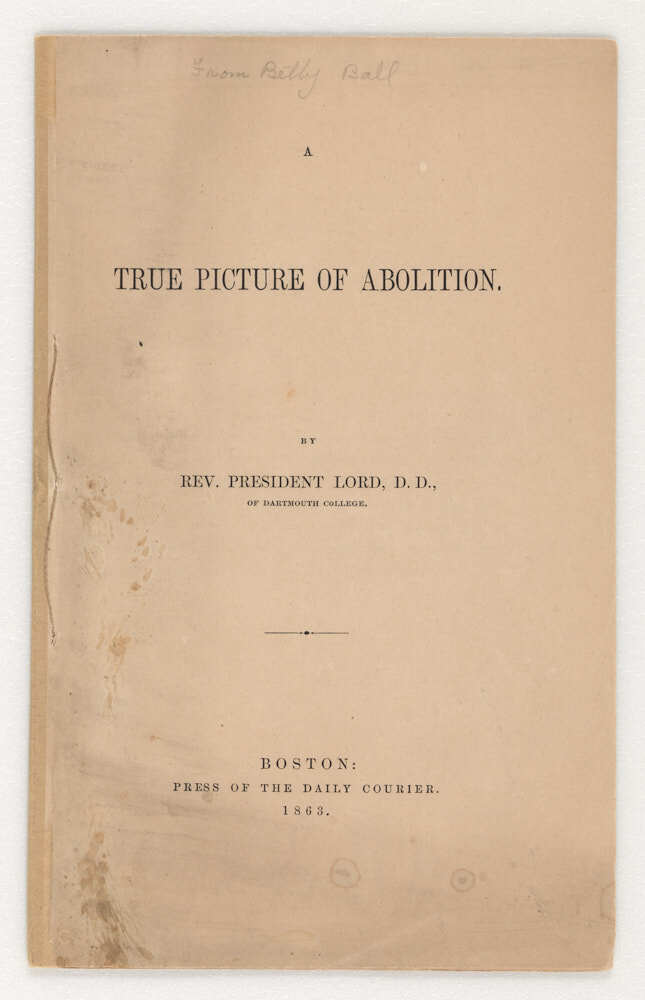
Nathan Lord, A True Picture of Abolition, Boston: Press of the Daily courier, 1863. MS-510, Box 1, Folder 27
In this pamphlet, Nathan Lord describes abolitionism as dishonorable, false, and the greatest danger to the Constitution and society. Lord states, “We find that, before the era of abolition, this whole country enjoyed remarkable union, peace, and prosperity for half a century.”
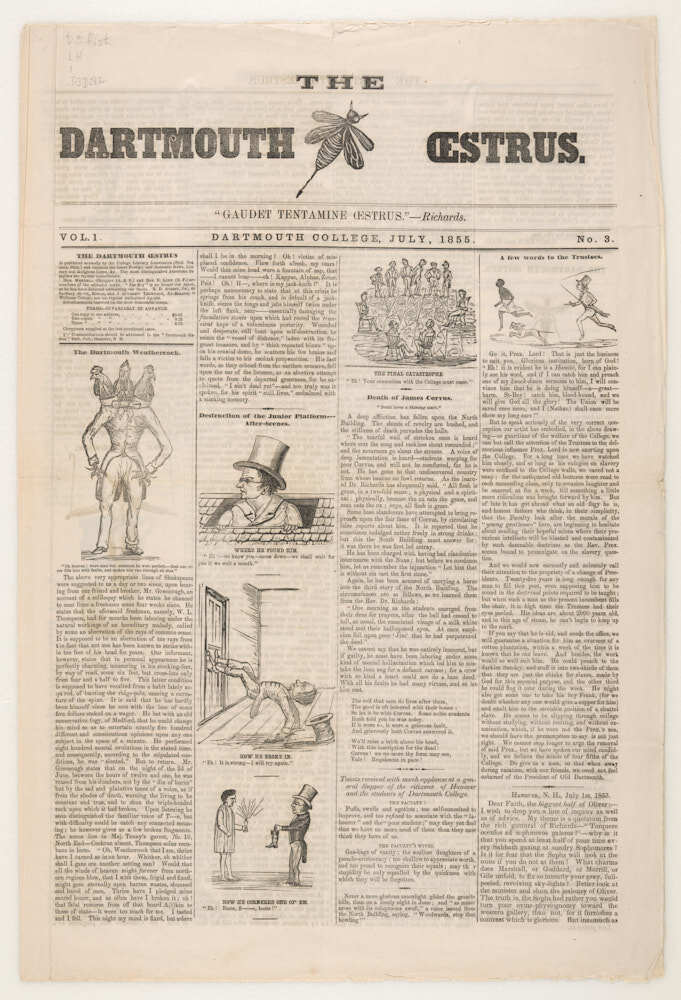
The Dartmouth Oestrus, Volume 1, no 3, 1855, Hanover, N.H. DC Hist LH1.D3 D282
An editorial cartoon in this student satirical newspaper depicts President Nathan Lord chasing a runaway slave. This illustration shows the discontent students felt for Lord’s support of slavery.
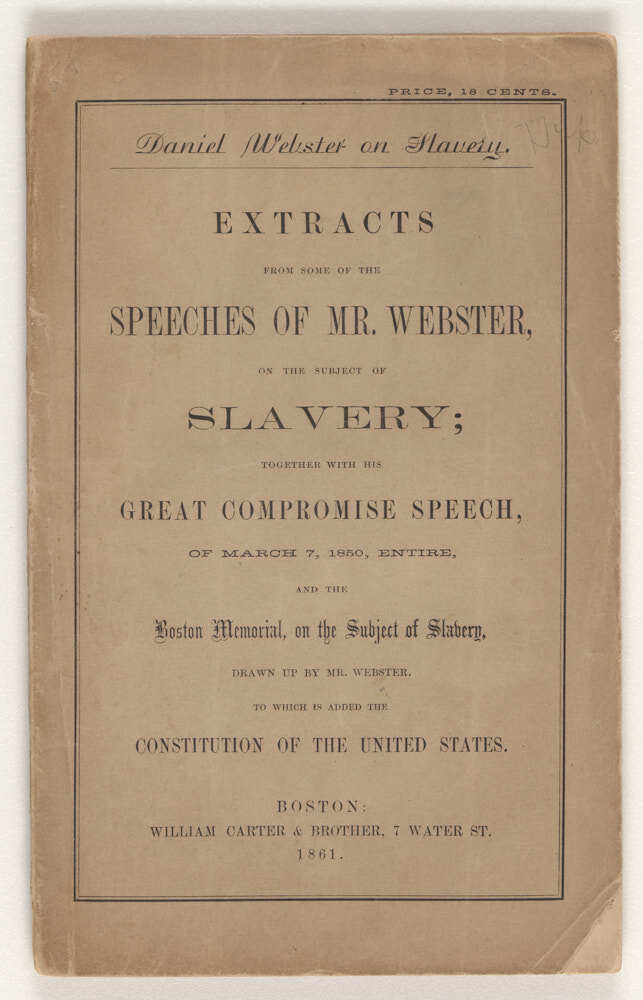
Daniel Webster, Daniel Webster on Slavery: extracts from some of the speeches of Mr. Webster, on the subject of slavery; together with his great compromise speech of March 7, 1850, entire, and the Boston memorial, on the subject of slavery, drawn up by Mr. Webster ; to which is added the Constitution of the United States, Boston: W. Carter & Brother, 1861. Webster E449.W37 1861
Daniel Webster, Class of 1801, is heralded as the legal champion of Dartmouth College because of his strategic thinking and oratory prowess in the case The Trustees of Dartmouth College v. Woodward. Webster saw himself as anti-slavery but was also pro-Union. In 1850, Webster voted in favor of the Fugitive Slave Act. This booklet contains Webster’s infamous Seventh of March speech before the Senate delivered in support of the Compromise of 1850. Read the full text on the Internet Archive.
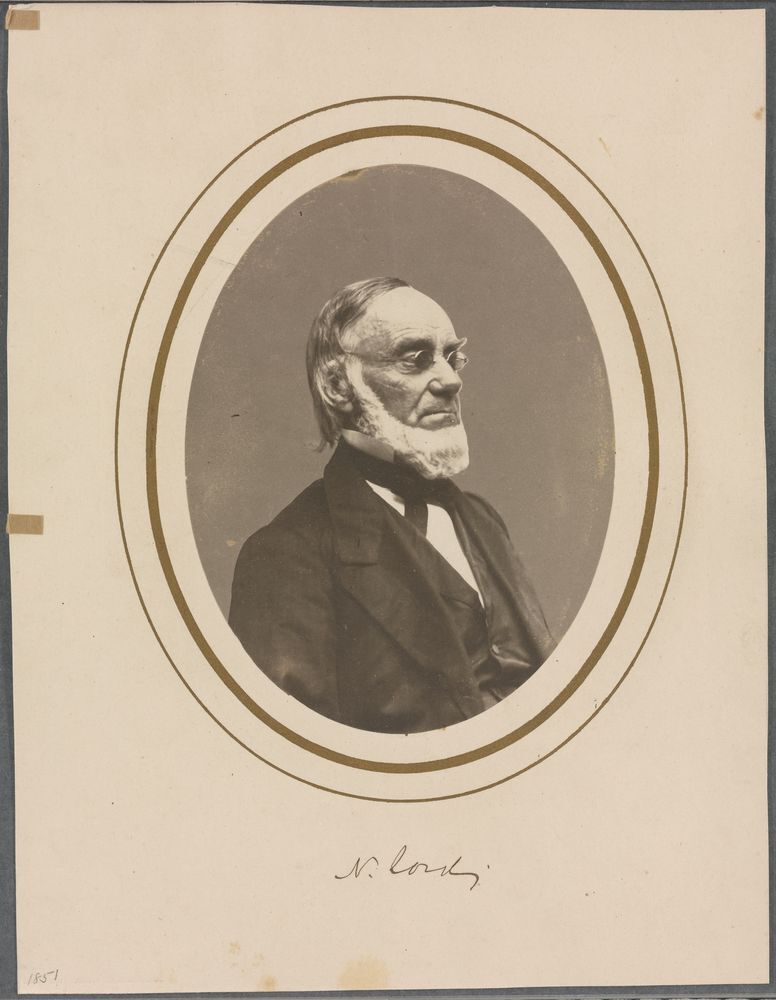
Portrait of Nathan Lord, President of the College 1828-1863. Iconography 1647-1217
"I put it to all the sober and sound minds at the North, as a question of morals and a question of conscience, what right have they, in their legislative capacity, or any other, to endeavor to get round this Constitution, to embarrass the free exercise of the rights secured by the Constitution, to the persons whose slaves escape from them? None at all-none at all."
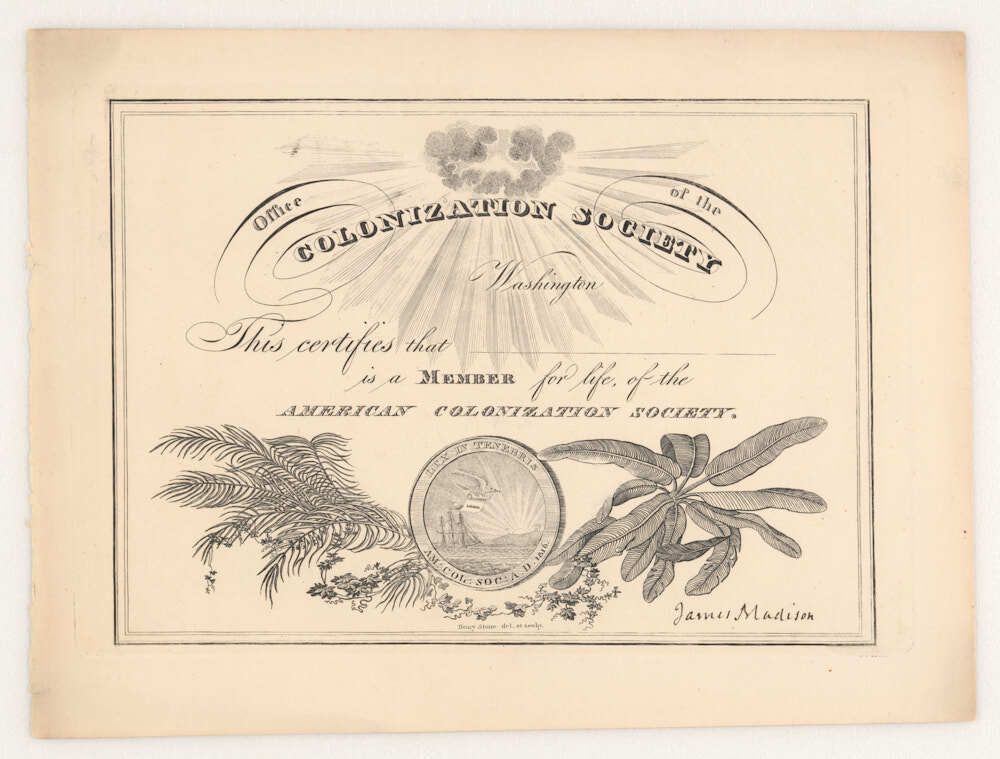
American Colonization Society membership certificate, signed blank. Madison, James. 01 December 1833. MS 001939
The Society for the Colonization of Free People of Color of America, commonly known as the American Colonization Society (ACS), was established in 1816. Daniel Webster was a founding member of the ACS in addition to Dartmouth Presidents Daniel Dana, Bennett Tyler, and Nathan Lord as well as many faculty members and alumni.

Carey, Mathew, and Mercer, Charles Fenton. Letters on the Colonization Society : with a View of Its Probable Results, Under the Following Heads: The Origin of the Society; Increase of the Coloured Population; Manumission of Slaves in This Country; Declarations of Legislatures, and Other Assembled Bodies, in Favour of the Society; Situation of the Colonists at Monrovia and Other Towns ... Addressed to the Hon. Charles F. Mercer ... Third edition, enlarged and improved. Philadelphia: Young, printer, 1832. Rare E448.C277 1832
This book is comprised of a series of letters directed to top politicians and possible supporters of the American Colonization Society. In one of the letters, the authors proudly boast that, “The legislatures of fourteen states, New Hampshire, Vermont, Connecticut, New York, New Jersey, Pennsylvania, Delaware, Maryland, Virginia, Georgia, Tennessee, Kentucky, Ohio and Indiana, have passed resolutions distinctly recommending the scheme of colonizing the free colored population, and most of them approving the objects of the Society. Eleven of those states have instructed their senators, and requested their representatives in Congress, to promote in the general government, measures for removing such free persons of color as are desirous of emigrating to Africa.
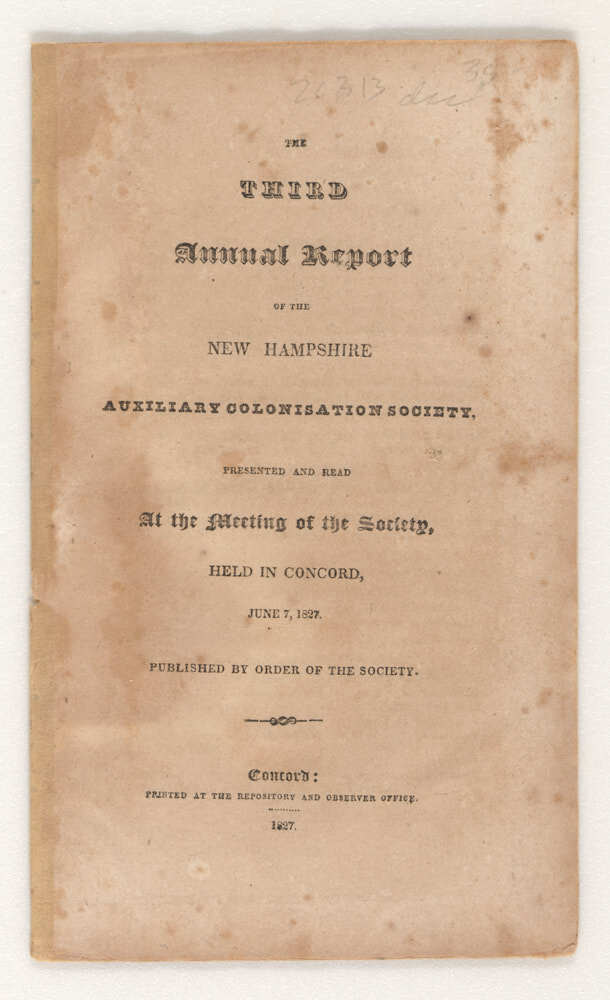
Tyler Bennet, The third annual report of the New Hampshire Auxiliary Colonisation [sic] Society: presented and read at the meeting of the Society, held in Concord, June 7, 1827, Concord, N.H. : The Society, 1827. DC Hist E446 .N46 1827
This pamphlet was revised by vice president of the state chapter, Bennet Tyler, who served as the President of Dartmouth College at the time of this meeting. A large part of the pamphlet is dedicated to outlining the vision and goals of the American Colonization Society. The society was set on resettling freed Black people and illegally traded slaves in a Christian colony named Liberia. ACS members viewed Africa as a God-designated site for Black people. The report contains an update on the Liberian colony proclaiming that "The prosperous condition of the Colony at Liberia is almost, if not altogether unparalleled in all colonial history."
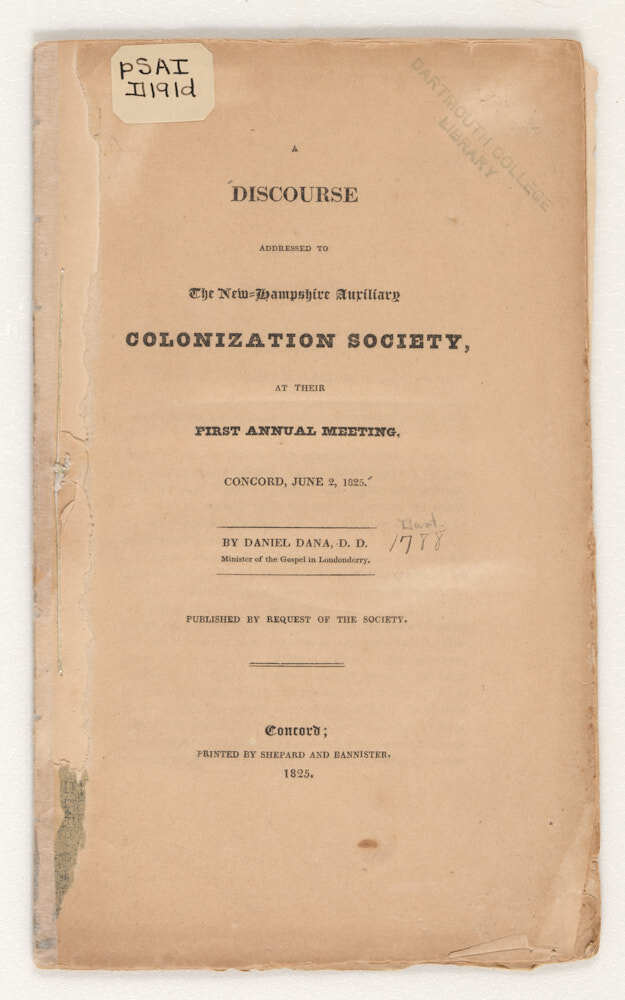
Daniel Dana, A discourse addressed to the New-Hampshire Auxiliary Colonization Society, at their first annual meeting. Concord, June 2, 1825, Concord: Printed by Shepard and Bannister. Rare E448 .D17 1825
Former Dartmouth President Daniel Dana addressed the first meeting of the New Hampshire Auxiliary Colonization Society. He writes that "The aim of the American Colonization Society, you now clearly perceive. It is to sever the free blacks of our country from the mass of our population and reunite them to their kindred in Africa. It is to take them away from a region to which they do not belong, and where they can never feel themselves at home; and give them back to the land for themselves at home: and give them back to the land for which the kind Author of their being framed and designed for them." Members of the ASC and NHACS felt that their organizations were "benevolent" because they were granting Black people an opportunity to prosper.
Previous: Dartmouth and the Debates on Slavery

